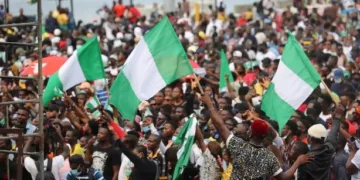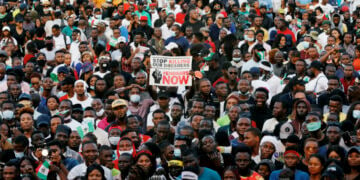In February this year, angry youths and women took to the streets of Minna, the Niger State capital, and Kano to protest what they described as the rising cost of living in the country. Similar protests also erupted in Ondo state in the Southwestern part of the country.
The protesters called on the Tinubu administration to address the challenge of hunger in the land.
In the face of this, the Northern wing of the Christian Association of Nigeria (CAN), in a statement released by its Secretary-General, Elder Sunday Oibe, in Kaduna, called on the federal government to, as a matter of urgency, step in and address the depressing economic and escalating security situation in the country.
The religious organisation noted that the suffering in the country was becoming unbearable for ordinary Nigerians as high cost of foodstuff, transportation, goods and other services have made life difficult for many Nigerians.
CAN argued that all these were being compounded by the escalating insecurity occasioned by rampant killings and kidnapping for ransom.
This newspaper recalls similar concern raised by the Sultan of Sokoto, Alhaji Muhammadu Abubakar lll-led Jama’atu Nasril Islam (JNI) that urged both federal and state governments to intervene in the prevailing economic hardship which had forced Nigerians into protests.
The nation is currently experiencing its worst economic crisis in a generation, leading to widespread hardship and anger.
Countdown to the one year inauguration of the present administration, we note with dismay that nothing much has changed except that the hunger crisis is increasing.
President Tinubu removed subsidies on petroleum products during his inauguration on May 29, 2023 and the prices of petroleum products increased by nearly 300 percent, pushing up the prices of other essential items.
The subsequent huge jump in the price of petrol has caused other prices to rise as companies pass on transportation and energy costs to the consumer.
This scourge of hunger and deprivation has found outlets in the frustration of the youths following the difficulties brought on by the policies of President Bola Tinubu, including the floating of the Nigerian currency.
The consequences of these policies have been rapid and sharp with galloping inflation having a devastating impact on the Nigerian populace.
The prices of basic food commodities such as rice, beans, maize, plantain, and tomatoes surged by 25.34 per cent to 40.01 per cent as of March 2024.
Amidst the economic hardship, the government increased the tariff to be paid on electricity by 603 per cent to N225 per kilowatts.
Despite the increase, the electricity generated is abysmal, fluctuating between 2,500 and 4,000mw, leading to the collapse of many small businesses
No doubt, the present economic situation, poverty level, removal of fuel subsidy, the galloping food inflation in the country are threats to the existence of an average Nigerian.
The biting economic hardship in Nigeria has continued to frustrate so many Nigerians, especially the youth who have become desperate to flee the country in search of greener pastures in other countries.
A poll conducted in August, 2023 by NOIPolls revealed that 63 percent of adult Nigerians nationwide disclosed they are willing to relocate to other countries if given an opportunity.
Interestingly, more youths, respondents within the age bracket 18 – 35 years (73 percent), formed the largest group with a willingness to migrate.
In addition, findings revealed the search for greener pasture (60 percent) is the major drive for migration, followed by education (32 percent).
In the same vein, three percent cited insecurity as the reason why they would like to migrate to foreign countries.
As hunger and insecurity continue to rear their ugly heads and the added plague of poor purchasing power, make the situation even gloomier.
Taking a cursory look at the streets of Nigeria, we observe that kidnapping, terrorism and banditry have become the order of the day with no redemptive assurance that it will get better.
The continued decline in the value of the naira and the seeming inability of the government to address the situation has completely weakened the purchasing power of ordinary Nigerians.
As the nation trudges on, government must take urgent steps to address the depressing economic and escalating security situation in the country.
With regards to recommendations on how the federal government can reduce the migration rate, the NOIPolls findings revealed that 64 percent Nigerians want the government to create jobs, 29 percent advised the government to tackle insecurity, and 26 percent proposed the provision of basic amenities.
Additionally, 25 percent want the government to reduce inflation, while 14 percent recommended the creation of better working conditions, 11 percent want the government to improve the welfare of citizens and 12 percent suggest improvement of healthcare services, economy, and electricity. These are basic fundamentals taken for granted in saner climes.





